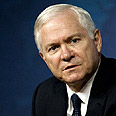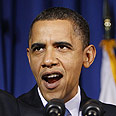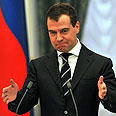


The Obama administration unveiled a new policy on Tuesday restricting US use of nuclear weapons but Defense Secretary Robert Gates emphasized that "all options are on the table" when it comes to nuclear-defiant Iran and North Korea.
Kicking off a hectic week for President Barack Obama's nuclear agenda, his aides rolled out a strategy review that renounced US development of new atomic weapons and could herald further cuts in America's stockpile.
The announcement, calling for reduced US reliance on its nuclear deterrent, could build momentum before Obama signs a landmark arms control treaty with Russia in Prague on Thursday and hosts a nuclear security summit in Washington next week.
"To stop the spread of nuclear weapons, prevent nuclear terrorism, and pursue the day when these weapons do not exist, we will work aggressively to advance every element of our comprehensive agenda: to reduce arsenals, to secure vulnerable nuclear materials, and to strengthen" international agreement, Obama said in a statement on Tuesday.
Obama's revamped strategy is likely to draw criticism from conservatives who say his approach could compromise US national security and disappoint liberals who wanted the president to go further on arms control.
Under the revamped policy, the United States for the first time is forswearing use of atomic weapons against non-nuclear countries, a break with a Bush-era threat of nuclear retaliation in the event of a biological or chemical attack.
But the new strategy comes with a major condition that the countries will be spared a US nuclear response only if they are in compliance with the Nuclear Non-Proliferation Treaty. That loophole means Iran and North Korea would not be protected.
During a news conference on the release of the US Nuclear Posture Review, Gates had a clear message for these two states.
"We essentially carve out states like Iran and North Korea, that are not in compliance with (the Nuclear Non-Proliferation Treaty), and basically all options are on the table when it comes to countries in that category along with non-state actors who might acquire nuclear weapons," Gates told reporters.
The Nuclear Posture Review is required by Congress from every US administration but Obama set expectations high after he vowed to end "Cold War thinking" and won the Nobel Peace Prize in part for his vision of a nuclear-free world.
Seeking to set an example, the Obama administration said the United States would consider use of nuclear weapons only in "extreme circumstances" and committed to not developing any new nuclear warheads.
But it said that while reducing the role of nuclear weapons in national security, the United States would strengthen its conventional arsenal.
The administration also pledged to pursue further arms control with Russia beyond the new START pact Obama and Russian President Dmitry Medvedev will sign this week promising to slash nuclear arsenals by a third.
Obama now faces the challenge of lending credibility to his arms control push while not alarming allies under the US defense umbrella or limiting room to maneuver in dealing with emerging nuclear threats from Iran and North Korea.
Next week Obama is due to convene a summit meeting in Washington, which will be attended by some 50 heads of state, to discuss nuclear security around the world. Iran is also holding a conference, to be held a few days after the US summit, under the heading – nuclear energy for all, nuclear arms for none.
Iran will be Obama's first major test for the new nuclear strategy. In an interview with the New York Times, Obama clarified that Iran's current direction will enable it to obtain nuclear capabilities, but he did not mention any timeline. He also avoided the question of whether the US was aware, as Israel is, that a nuclear Iran is to all intents and purposes the same as a nuclear-armed Iran.
The review is a test of Obama's effort to make controlling nuclear arms worldwide a signature foreign policy initiative. It is also important because it will affect defense budgets and weapons deployment and retirement for years to come.
Yitzhak Benhorin also contributed to this report.















